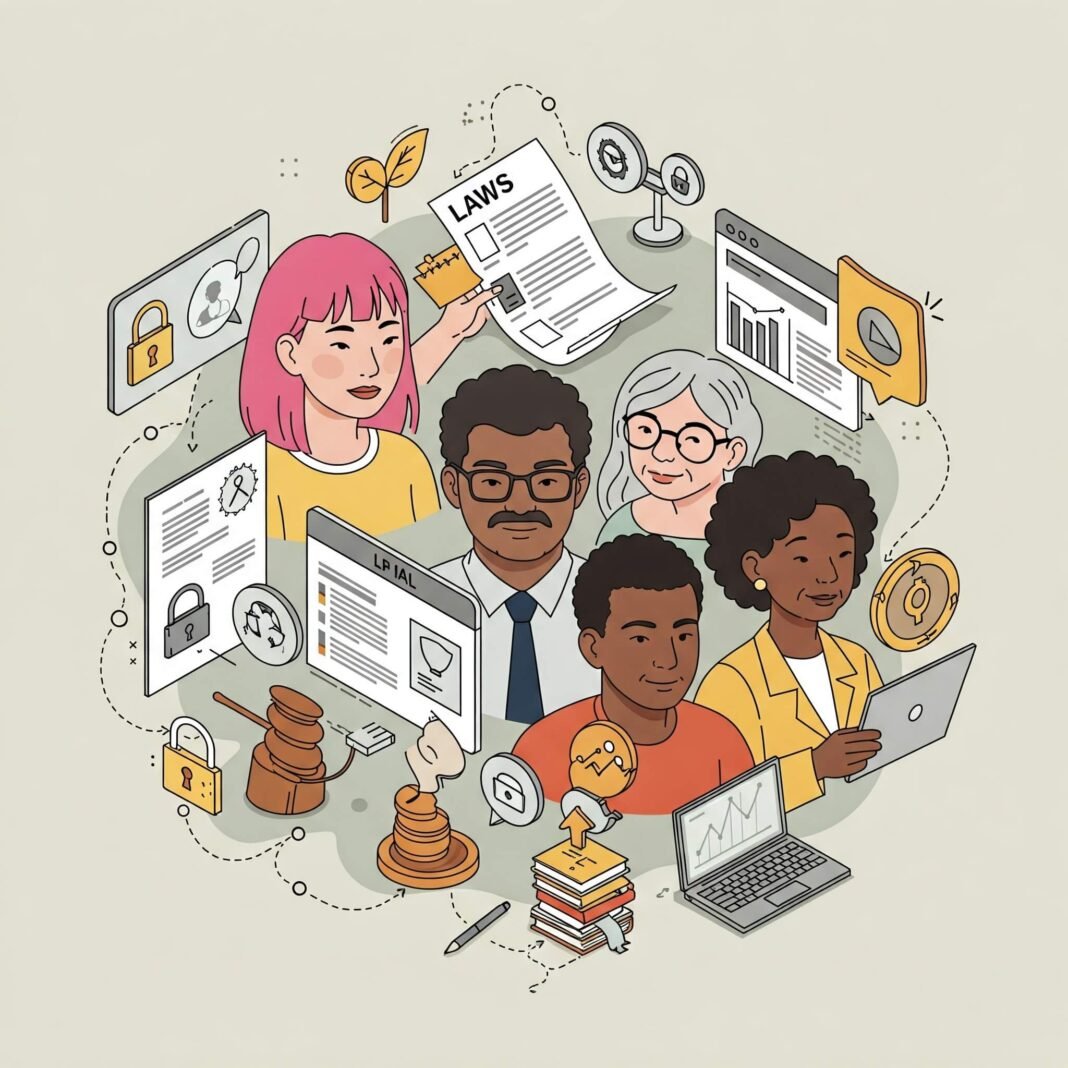The world around us is constantly evolving, and so too is the legal landscape. Governments, both national and local, regularly update regulations to address new challenges, technological advancements, and societal shifts. As we look ahead, several new laws affecting you in 2025 are set to take effect, bringing significant changes to various aspects of daily life.
Staying informed about these 2025 legal changes isn’t just about compliance; it’s about understanding your rights, responsibilities, and how you might need to adapt. As someone who’s spent years tracking these developments, I can tell you that being prepared makes a big difference. These aren’t just abstract rules – they have real, tangible impacts of new laws on how you work, shop, protect your data, and even how you contribute to environmental efforts.
We’ve sifted through potential legislative changes and emerging regulatory trends to bring you five key areas where new laws affecting you in 2025 are likely to make their mark. Let’s dive in.
Understanding New Laws Affecting Your Digital Privacy in 2025
In our increasingly connected world, protecting personal data is paramount. Building on existing frameworks, 2025 is poised to bring stronger privacy laws affecting you in 2025.
Key Changes in Digital Privacy Regulations
Look out for enhanced requirements around data collection consent. This could mean:
- Websites and apps needing clearer permission before collecting certain types of data.
- Simplified processes for you to request access to or deletion of your personal information held by companies.
- More stringent rules and quicker notification periods for companies experiencing data breaches.
How These New Laws Affect You: These updates aim to give you more control over your digital footprint. You should have better transparency on what data is being collected and a stronger ability to manage or remove it.
Actionable Takeaway: Get into the habit of reviewing privacy policies and permissions when signing up for new services or apps. Understand what data you’re agreeing to share.

- Outbound Link Example: Learn more about general digital privacy principles from the Federal Trade Commission (FTC). (Note: Link is to a general resource as specific 2025 laws are hypothetical)
How New Laws Affecting Consumer Goods in 2025 Address Sustainability
Environmental concerns continue to drive legislation. For 2025, expect new environmental regulations affecting you in 2025, particularly concerning packaging.
New Mandates for Sustainable Packaging Materials
Several jurisdictions are implementing or strengthening laws that require companies to use more sustainable materials for product packaging. This could include:
- Minimum percentages of recycled content in plastic or cardboard packaging.
- Requirements for packaging to be easily recyclable or compostable.
- Potential phase-outs of certain hard-to-recycle materials or excessive packaging.
How These New Laws Affect You: You might notice changes in how products are packaged – potentially less plastic, different materials, or simpler designs. This supports broader environmental goals, though it could slightly affect product presentation or cost in some cases.
Actionable Takeaway: Pay attention to recycling labels and guidelines in your area. Support brands that are transparent about their sustainable packaging efforts.

- Outbound Link Example: Read about trends in sustainable packaging from a resource like the Environmental Protection Agency (EPA). (Note: Link is to a general resource)
Navigating New Laws Affecting Remote Workers and Businesses in 2025
The shift towards remote and hybrid work continues, prompting authorities to clarify the rules around it. New laws affecting you in 2025 are expected to address aspects of remote employment.
Clarified Compliance Standards for Remote Employment
These regulations might aim to standardize expectations for employers regarding remote staff, potentially covering areas like:
- Guidelines for reimbursing remote work expenses (internet, electricity, office supplies).
- Ensuring ergonomic and safe remote workspaces, even at home.
- Clarifying state or national tax obligations when employees work from a different location than the company’s base.
How These New Laws Affect You: If you work remotely, these changes could lead to clearer company policies, better support for your home office setup, and potentially affect how your income is taxed depending on your location.
Actionable Takeaway: Talk to your HR department about updated remote work policies. If you work across state or national borders, understand the potential tax implications and consult a professional if needed.

- Outbound Link Example: Explore general resources on labor law and remote work considerations from a source like the Department of Labor. (Note: Link is to a general resource)
Boosting Your Rights: New Laws Affecting Online Shopping in 2025
Online commerce is booming, and so is the need for robust consumer protection. Get ready for stronger consumer rights laws affecting you in 2025 when you shop online.
Enhanced Protections Against Online Scams and Misleading Practices
Anticipated regulations aim to create a safer online marketplace by:
- Imposing stricter requirements on platforms to combat fake reviews and testimonials.
- Mandating clearer and more transparent pricing, including disclosing all fees upfront before purchase.
- Potentially standardizing or simplifying online return and refund processes across different vendors.
How These New Laws Affect You: These changes are designed to build trust in online shopping. You should be less likely to be misled by false advertising or fake reviews and have a clearer path if you need to return an item.
Actionable Takeaway: Even with enhanced protections, remain vigilant. Use secure payment methods and buy from reputable sites. Know your rights regarding returns and refunds.

- Outbound Link Example: Check resources on online shopping safety from consumer protection bodies like the Consumer Financial Protection Bureau (CFPB). (Note: Link is to a general resource)
Understanding New Laws Affecting Gig Workers’ Income in 2025
The gig economy is a major part of the modern workforce. To keep pace, new laws affecting you in 2025 are being considered or implemented to standardize or clarify income reporting for freelancers and contract workers.
Clarified or Standardized Reporting Requirements for Gig Earnings
Changes could include:
- Adjustments to the thresholds for when platforms (like payment processors or marketplaces) must issue tax forms (e.g., 1099-K).
- Simplified guidelines or forms for reporting various types of freelance income and related expenses.
- Increased efforts to ensure compliance among gig workers regarding income tax and self-employment tax.
How These New Laws Affect You: If you earn income through freelancing, contract work, or platforms like ride-sharing or delivery services, these laws could simplify your tax reporting or require more diligent record-keeping throughout the year.
Actionable Takeaway: Keep meticulous records of all your gig income and related business expenses. Consider setting aside a portion of your earnings for taxes and consult a tax professional if your situation is complex.

- Outbound Link Example: Find general information on tax requirements for independent contractors from the Internal Revenue Service (IRS). (Note: Link is to a general resource)
Stay Informed About New Laws Affecting You in 2025
The legal landscape is always in motion, and 2025 promises notable shifts across digital privacy, sustainability, work, consumer rights, and the gig economy. These five areas highlight just some of the new laws affecting you in 2025 that could impact your daily life and decisions.
While we’ve covered potential broad strokes, the specifics of each law can vary significantly by region and evolve during implementation. The key takeaway? Stay proactive. Follow reputable news sources, check government websites for official announcements, and consult professionals (like lawyers or accountants) when specific laws impact your business or personal finances directly.




